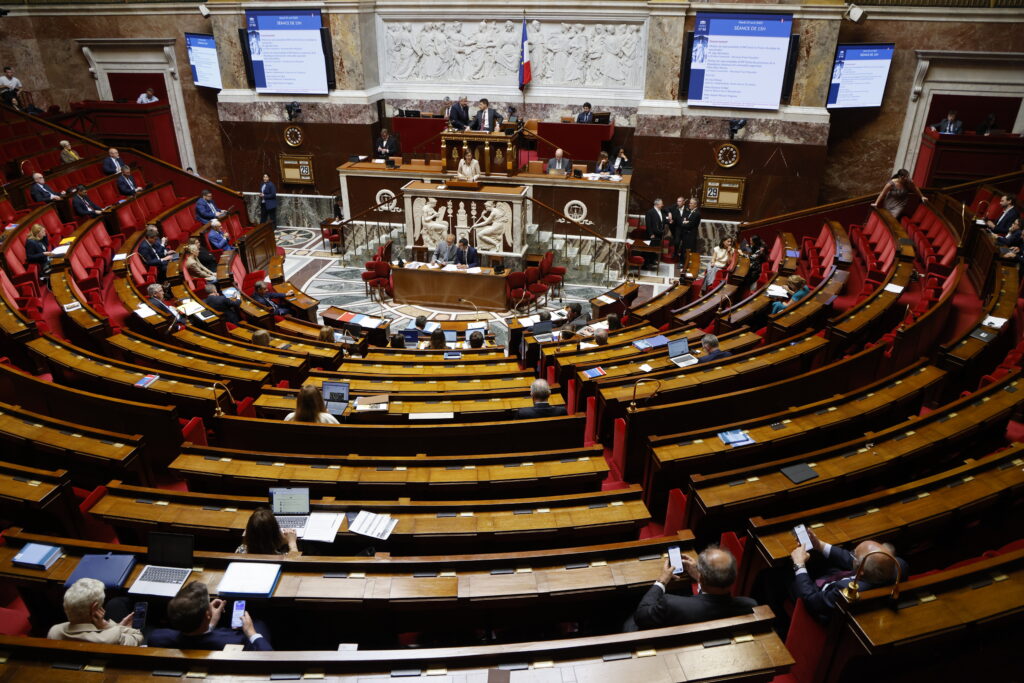Les députés s’invectivent lors de l’examen d’un texte contre l’antisémitisme à l’université
Les députés ont commencé mardi à discuter d’une proposition de loi pour lutter contre l’antisémitisme dans l’enseignement supérieur, sans pour autant aller très loin dans son examen, lors d’une séance tendue où ont fusé les accusations et les invectives.Seul le premier article du texte, qui avait été adopté à l’unanimité au Sénat, a pu être voté mardi à l’Assemblée, le reste de la discussion devant reprendre mercredi après-midi. Cet article premier prévoit d’inscrire la sensibilisation à la lutte contre l’antisémitisme et le racisme parmi les missions de formation des établissements. Le texte, porté par Pierre Henriet (Horizons) et Constance Le Grip (groupe macroniste Ensemble pour la République), entend par ailleurs renforcer les dispositifs de prévention et de signalement, en rendant obligatoire au sein de chaque établissement des “référents” dédiés à la lutte contre le racisme et l’antisémitisme.”Pas un seul étudiant ne doit hésiter à se rendre en cours parce qu’il craint d’être exposé à l’antisémitisme”, a martelé en ouverture des débats le ministre de l’Enseignement supérieur Philippe Baptiste.”Depuis le 7 octobre 2023, nous avons assisté à une augmentation alarmante des actes antisémites dans notre société, et l’enseignement supérieur, malheureusement, n’a pas été épargné”, a-t-il ajouté.Les débats se sont tendus au fil de la soirée. La France insoumise, seul groupe à avoir voté contre l’article premier, souhaitait le réécrire en utilisant la définition des discriminations du code pénal, ne contenant pas le mot d’antisémitisme. Les Insoumis, qui ont aussi critiqué le manque de moyens pour les nouvelles formations, ont été accusés de vouloir “invisibiliser” l’antisémitisme par des députés de droite, d’extrême droite et macronistes. La ministre chargée de la lutte contre les discriminations Aurore Bergé a également interpellé les Insoumis, les accusant de “stratégie électorale” et de “faire monter” la “peur” vis-à-vis “de nos compatriotes juifs”. La cheffe de file des députés LFI, Mathilde Panot l’a accusée en retour de “tordre entièrement les faits” et “d’instrumentaliser l’antisémitisme pour faire taire les voix pour la paix sur le génocide en Palestine”.- Procédure disciplinaire -Les députés n’examineront que mercredi l’article 3 du texte, qui fait encore davantage débat que les premiers. Supprimé lors de son examen en commission à l’Assemblée, il prévoit la création d’une “section disciplinaire commune” aux établissements d’une même région académique, présidée par un membre de la juridiction administrative. Le co-rapporteur Pierre Henriet – qui a rappelé que neuf étudiants juifs sur dix disent avoir subi des actes antisémites à l’université, selon un sondage de l’Union des étudiants juifs de France – entend défendre la réintroduction par amendement de cette disposition. Elle permettrait selon lui aux chefs d’établissements d’externaliser le processus disciplinaire sur les dossiers les plus sensibles.”Le renforcement de la procédure disciplinaire est nécessaire”, ces démarches étant souvent “trop longues”, et “les actes antisémites, trop rarement sanctionnés”, a estimé la députée MoDem Géraldine Bannier. Mais la gauche est elle opposée à cet article 3. “La volonté de professionnaliser la justice disciplinaire par le recours à un juge administratif rompt avec la tradition des universités autonomes”, a fustigé le député écologiste Steevy Gustave.Le communiste Jean-Paul Lecoq a lui critiqué la liste des faits passibles d’une sanction disciplinaire ajoutée au code de l’éducation par le même article, comportant notamment “les faits susceptibles de porter atteinte à l’ordre, au bon fonctionnement de l’établissement”. Des dispositions qui risquent selon lui “de porter atteinte aux droits et à la liberté de manifestation des étudiants”.




